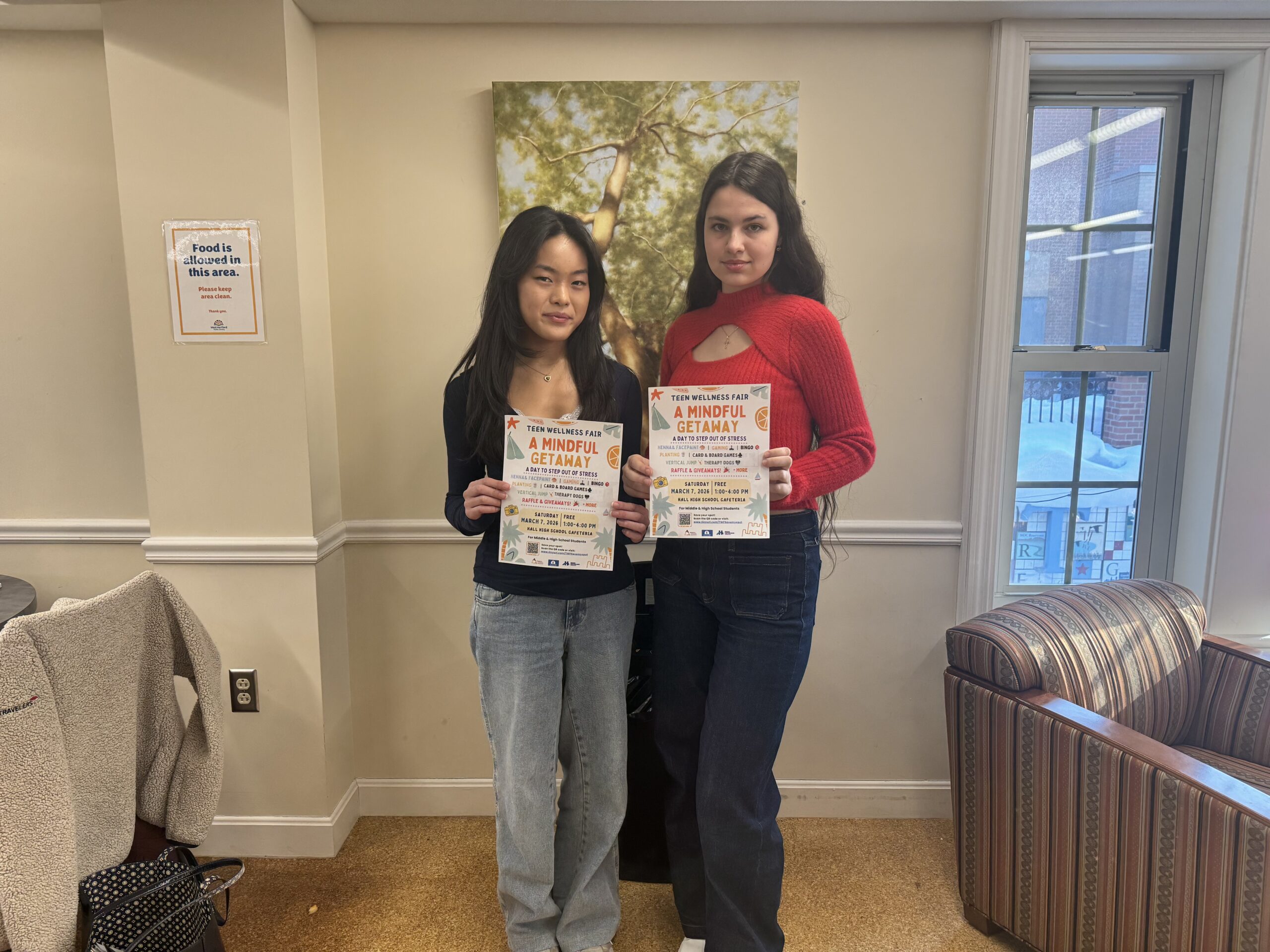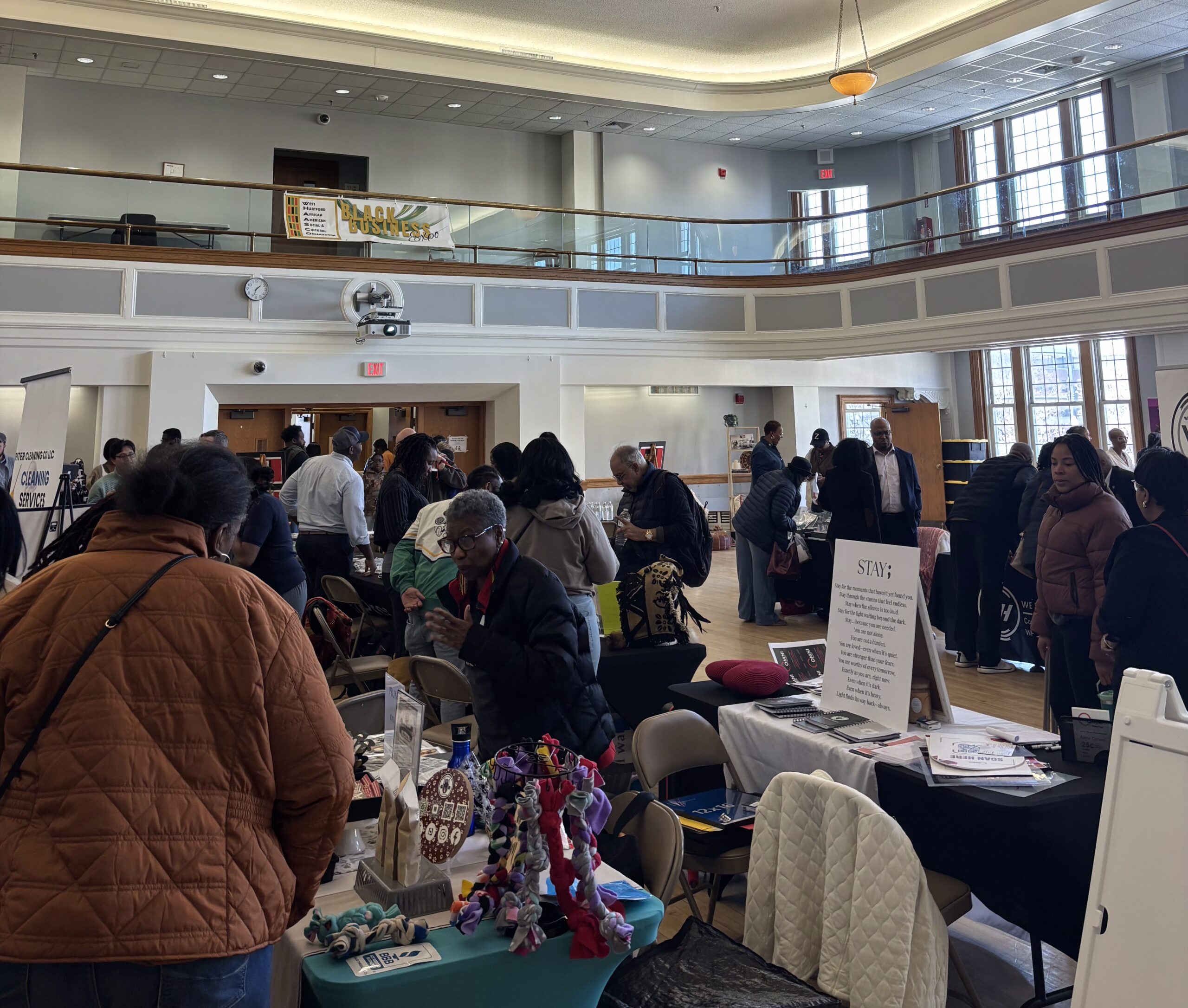West Hartford Town Council Updates Cannabis Ordinance

Audio By Carbonatix
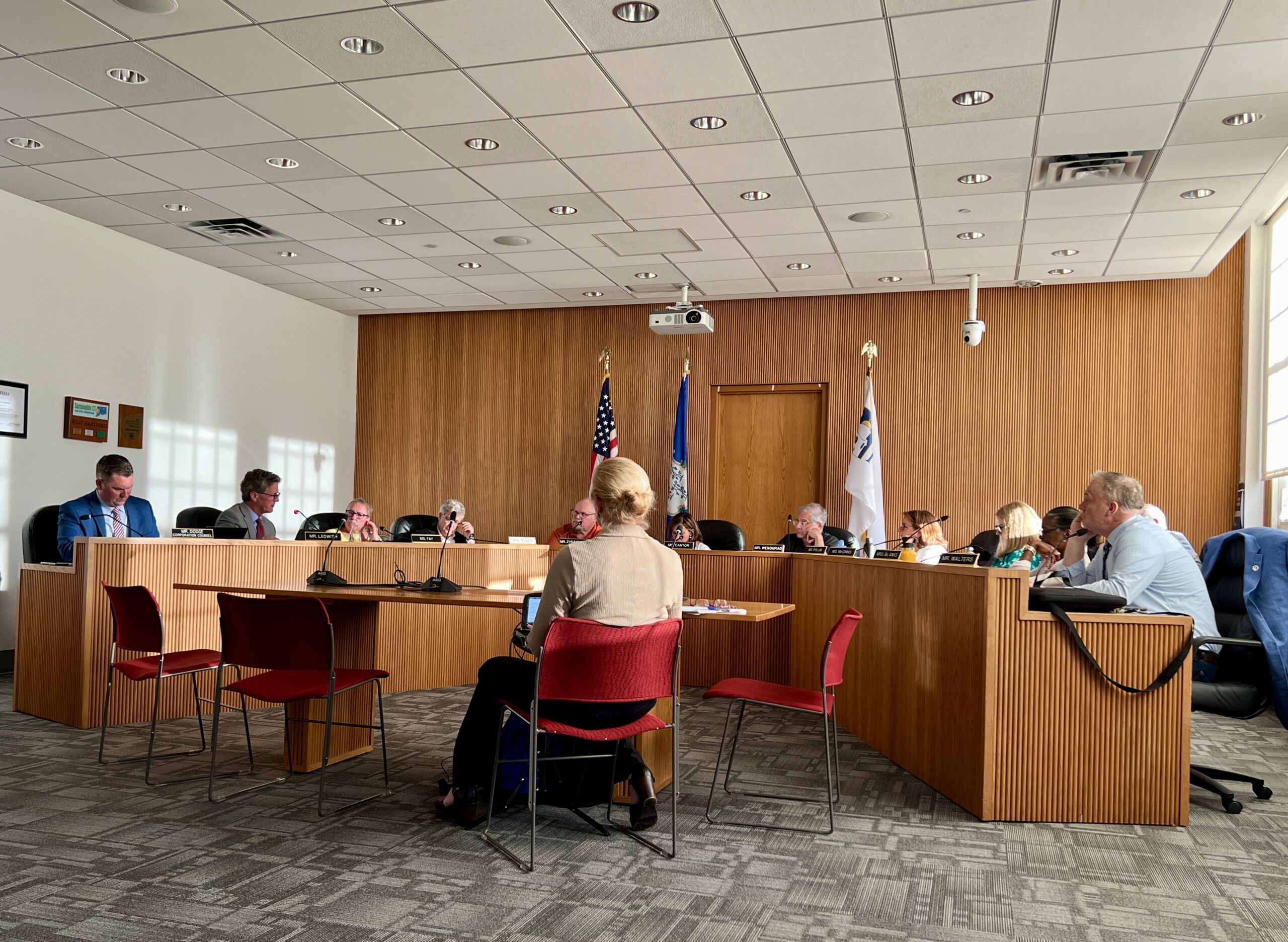
Town Council members, with Burke Doar a zoning alternate, listen as Town Manager Rick Ledwith speaks about proposed updates to the town's adult use cannabis regulations on May 28, 2024. Photo credit: Ronni Newton
The West Hartford Town Council voted 6-3 Tuesday, along party lines, on modifications to the cannabis ordinance which will now allow an additional retailer to open in town, but adds a buffer between retailers.
By Ronni Newton
West Hartford’s zoning ordinance adopted in May 2022, permitting the sale and cultivation of adult-use cannabis in town subject to certain regulations, was enacted as a temporary measure, sunsetting on June 30, 2024, and Tuesday night a permanent ordinance was adopted by the Town Council, 6-3, with all six Democrats voting in favor of the revised regulation and the three Republicans voting against it.
There were no speakers at a public hearing held just prior to Tuesday night’s Council meeting, and no submitted testimony, but the hearing provided an opportunity for Town Manager Rick Ledwith to review and respond to questions from Council members about the proposed modifications to the ordinance, which had previously been discussed extensively by the Council’s Community Planning and Economic Development Committee (CPED).
The most significant updates to the zoning regulations for adult use cannabis are to allow up to three retail establishments to be located in West Hartford – an increase from the current limit of two – but limited to the BN, BS, and BG zones, which are all commercial zones. West Hartford Center and Blue Back Square, as well as the business district of Elmwood, are not included in the permitted zones. In addition, a buffer of 5,000 feet will now be required between cannabis retailers. The technical rules for measuring the distance between retailers and the distance from municipal properties was also modified in the updated ordinance to be in line with the measurement regulations used for liquor stores.
The two existing cannabis retailers – BUDR and Sweetspot, which Ledwith said have both become “welcomed members of our business community” – are roughly 1,100 feet from each other, at the intersection of Boulevard and Park Road with Prospect Avenue respectively. Cannabis retailers in those locations are grandfathered from the distance restriction in the newly adopted ordinance, Ledwith said.
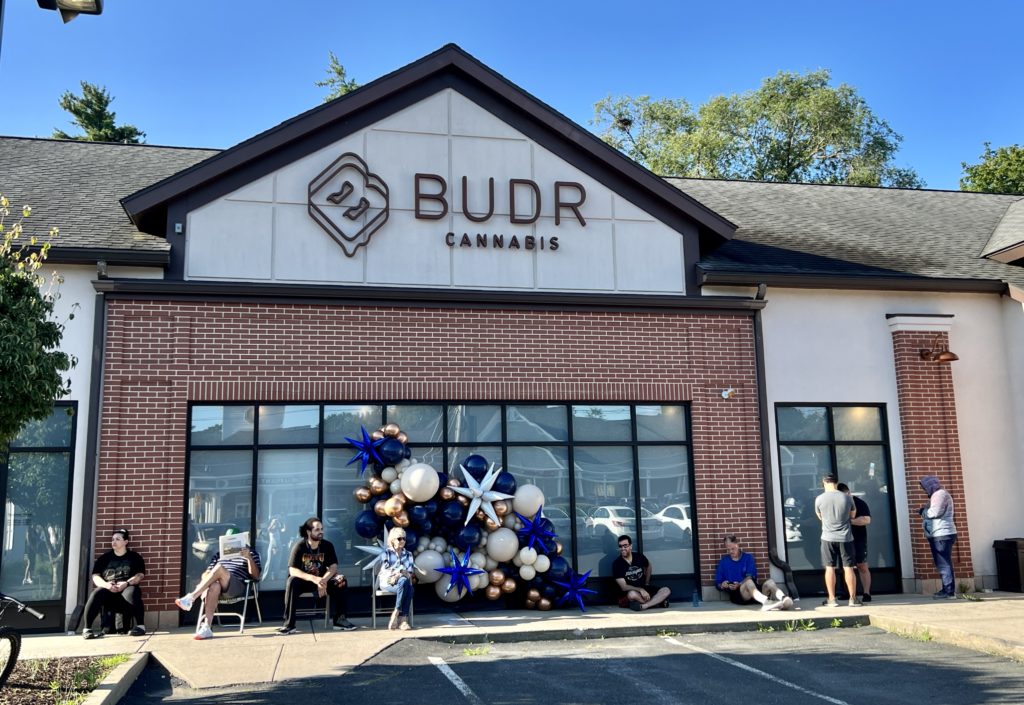
There was a line outside Budr, West Hartford’s first cannabis retailer, on opening day, July 31, 2023. Photo credit: Ronni Newton (we-ha.com file photo)
When Public Act No. 21-1, An Act Concerning Responsible and Equitable Regulation of Adult-Use Cannabis (RERECA), was first signed into law in July 2021, Ledwith noted, there was a cap on the number of licenses that would have been awarded to a particular municipality at one retailer and one producer each per 25,000 of population, through June 30. 2024. There was also some initial confusion about whether the intent of the population limit was to round up or down – and whether West Hartford, with roughly 64,000 residents – would be permitted by the state to have two or three retailers. Further clarification indicated that the intent was to round down.
Midway through the May 24, 2022 Town Council meeting, however, while the ordinance was being considered, Gov. Ned Lamont signed PA-22-103, a bill passed by the legislature as HB 5329, which eliminated the restriction of the number of licenses based on population. Although the state removed the restriction, after discussion the ordinance approved by the Town Council that night included a cap of two retail establishments and two producers each in West Hartford, mandated a 500-foot buffer from schools, public parks, municipal recreation facilities, and libraries, and designated certain zones where retailers could be located and separate zones where production facilities could be located.
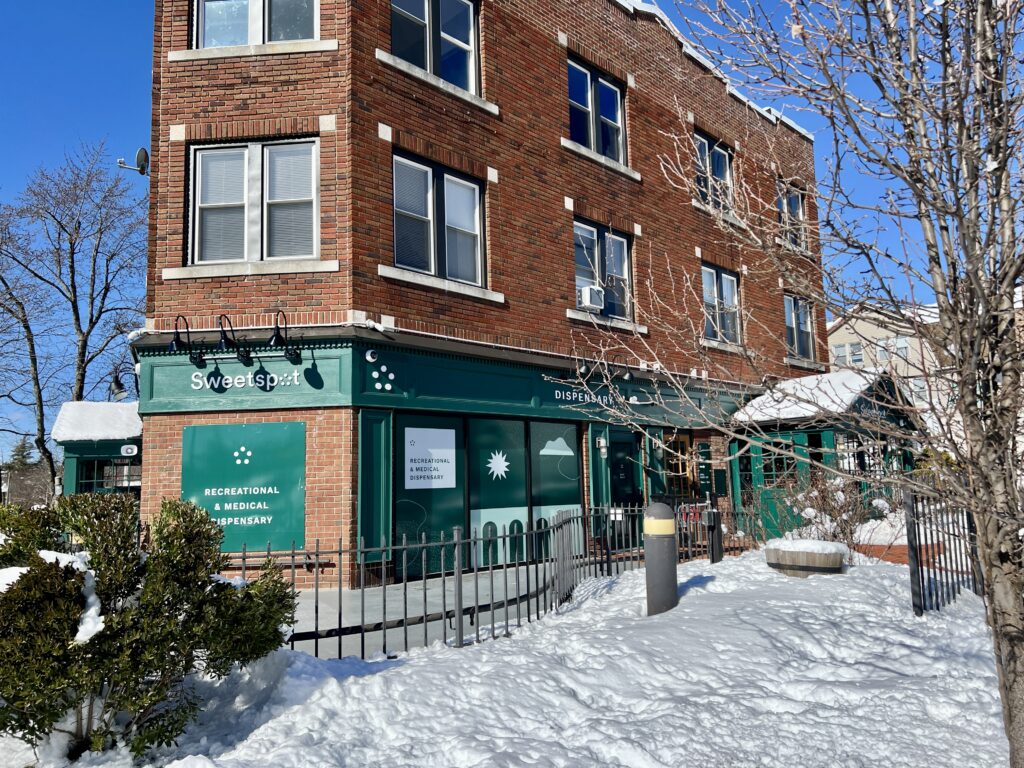
Sweetspot opened at 2 Park Road in West Hartford in February 2024. Photo credit: Ronni Newton (we-ha.com file photo)
Republican Mary Fay asked during the pubic hearing why Bishops Corner was not excluded while other business districts were. Ledwith noted that the two existing retailers are very close to each other, and “by leaving Bishops Corner as a potential spot that creates an even further buffer from those two locations.”
Many of the retail spaces in the Center and Blue Back Square are within 500 feet of a municipal building or the Veterans Memorial, which would exclude them from being eligible as a cannabis establishment, Ledwith said, and members of CPED determined the best solution would be not to include those zones as eligible locations.
Fay was one of the votes against the original ordinance, and noted Tuesday before voting against the revision that there is still limited data and she is concerned about allowing an establishment in Bishops Corner.
Ledwith said the 5,000-foot buffer, which is just shy of a mile, will also eliminate additional retailers from opening along Park Road.
Burke Doar, the zoning alternate for Republican Alberto Cortes, who was absent from the meeting, asked about the impact of the new ordinance on production facilities, including micro-cultivators and food and beverage manufacturers. Ledwith said the new ordinance does not limit the number of producers able to operate in town, but does restrict their locations to industrial zones as was the case with the temporary ordinance. Currently there are not any producers in West Hartford.
Doar, before voting against the revised ordinance, also voiced concern about the smell of marijuana being viewed as a “nuisance” by many in the community. “I think in the future towns are going to have to wrestle with that,” he said, stating that his concerns “outweigh the merits” of the ordinance.
Democrat Carol Blanks noted that over the weekend she had observed business being brisk at one of West Hartford’s existing cannabis retailers, and thought it made sense to allow an establishment elsewhere in town. “For folks on the other side of town it would be to their advantage … clearly there is a need for these services in our community,” she said.
Republican Mark Zydanowicz, who voted against the revised ordinance, thought there really wasn’t enough history with the current regulations to warrant allowing another retailer. “We tried to avoid the cluster and we kind of got it,” he said, asking if there is a third and all are busy if the Council will revisit the ordinance again in two years. He said that if a fast food restaurant like McDonald’s is busy, you don’t just open another one; you wait a little longer in line for your burger if you want it.
Zydanowicz said he appreciated the 5,000-foot buffer, but thought the Council’s original decision to allow two retailers was fine as is.
Democrat Deb Polun said cannabis is a legal product in Connecticut, and other retailers are not regulated to this extent. “I do agree with Mr. Doar that the smell is a nuisance,” she said, adding that she “personally can’t stand it.” But people will buy it elsewhere and the nuisance of the smell isn’t going to be tied to the number of retailers in town, she said.
Deputy Mayor Ben Wenograd agreed. “We as a zoning authority have a lot of power,” he said, recommending that the Council “be humble” about that power and “I think we also need to be humble about these broader public policy issues.”
Wenograd recommended a more “libertarian, laissez faire” approach to legal businesses in our town, and said since cannabis retailers have been permitted, he is not aware of any issues involving the police or traffic problems.
“I think how we got here is not a perfect process … but limited expansion is justified by our experience,” Wenograd said.
“I am grateful for all your comments and I actually agree with all of you,” Mayor Shari Cantor said, noting that cannabis is a product with benefits and risks “and can also be a nuisance.” Reckless driving is something that overall needs to change, she said, and she agreed with Wenograd “that we should never zone for our own personal beliefs.”
Cantor said she has had friends who have suffered from terminal cancer, with cannabis providing the only relief – and in the past that had meant their caretakers had to travel to obtain the product. While the analogy to hamburgers provided by Zydanowicz makes sense for many products, “for this, as we do try to figure out what the right number is, geographical spread is really important for the people who do struggle with a variety of issues.” She said she thinks three, with the 5,000-foot buffer and the measurement consistent with calculating the distance between liquor stores is appropriate.
The town’s existing ordinance has a sunset, Cantor said, and she said while the state may add further restrictions to the cannabis industry in the future, she doesn’t anticipate the town needing to further modify its ordinance.
Absent any ordinance, cannabis retail businesses would be able to open in town “as of right,” and would not be subject to any buffer or restrictions other than those in place for any other types of retail establishments.
Like what you see here? Click here to subscribe to We-Ha’s newsletter so you’ll always be in the know about what’s happening in West Hartford! Click the blue button below to become a supporter of We-Ha.com and our efforts to continue producing quality journalism.


